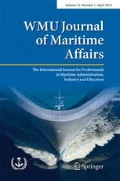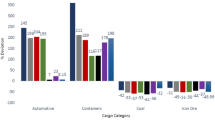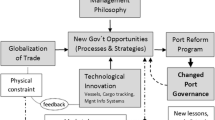Abstract
The Brazilian seaport infrastructure has witnessed significant changes in the cargo volumes and trade profile as a consequence of Brazilian economy participation in international trade during the 1990s and more in the 2000s. In the main ports, not only the volume of containerized cargo has presented double-digit growth but also the bulk cargo (dry and liquid) have broken records. The Brazilian port system has been through a legal transformation in the mid-1990s with the Port Reform Law 1993 (Act 8630) and the first landlord concessions were signed in years 1995/1997. Then, 20 years later, in 2012, another port reform law was proposed and in a record time fashion, it was passed as law (Act 12815) in the year 2013. This paper analyzes the process by which the Brazilian Port Reform law was passed in Congress, aiming to capture the political dimension of such changes. The study uses content analysis methodology to examine a series of public documents to explicit the motivations, the changes proposed and the final text passed in Congress. The results demonstrate that the port reform law, beyond its economical motivations, represented the political dimension of the port development in Brazil, and as such, it was under the influence of different groups of interest through their Congress Representatives who have disputed the law shape and content.
Similar content being viewed by others
Data availability
All data used in this research is publicly available as mentioned in the “Methodology and data” section and full references listed.
References
ANTAQ - Agência Nacional de Transportes Aquaviários (2015) Desempenho Portuário. Relatório Estatístico. 2015a. Available at http://www.antaq.gov.br/Portalv3/SDPV2ServicosOnline/index.html
Bardin L (1979) Análise de conteúdo. Lisboa: Edições 70:1979
BNDES - Banco Nacional do Desenvolvimento Econômico Social (2012). Relatório Consolidado: Análise e Avaliação da Organização Institucional e da Eficiência de Gestão do Setor Portuário Brasileiro. Ano 2012. Booz & Company do Brasil Consultores Ldta, Verax Consultoria e Projetos, Logit Engenharia Consultiva e Machado, Meyer, Sendacz e Opice Advogados. Available at http://www.bndes.gov.br/SiteBNDES/bndes/bndes_pt/Institucional/Apoio_Financeiro/Apoio_a_estudos_e_pesquisas/BNDES_FEP/prospeccao/chamada_setorportuario.html
Brooks, M. R., & Cullinane, K. (Eds.). (2007). Devolution, port governance and port performance. Elsevier, JAI Press. Paperback ISBN: 9781493303328. eBook ISBN: 9780080467078
Brooks MR, Cullinane KP, Pallis AA (2017) Revisiting port governance and port reform: a multi-country examination. Res Transp Bus Manag 100(22):1–10
Cappelle, M. C. A., Melo, M. C. D. O. L., and Gonçalves, C. A. (2003). Análise de conteúdo e análise de discurso nas ciências sociais. Organizações Rurais e Agroindustriais/Rural and Agro-Industrial Organizations, 5(1511-2016-131205).
CN - Congresso Nacional (2013). Projeto de Lei de Conversão (CN) n.° 9, de 2013 - MP DOS PORTOS / LEI DOS PORTOS. Avulso da Matéria contendo todos os documentos. Available at http://www25.senado.leg.br/web/atividade/materias/-/materia/112464
Collyer WO (2008) Lei dos portos: o conselho de autoridade portuária e a busca da eficiência. Lex Ed, São Paulo
Dair AN Jr (2013) Sistema Portuário no Brasil: perspectivas de modernização do setor a partir da implementação da Lei n° 12.815/13 (“Nova Lei dos Portos”). 136p. Trabalho de Conclusão de Curso – Monografia apresentada ao Departamento de Estudos da Escola Superior de Guerra como requisito à obtenção do diploma do Curso de Altos Estudos de Política e Estratégia (CAEPE), 2013
FNP - Federação Nacional dos Portuários (2013) Apresentação feita durante a Audiência Pública do dia 05/03/2013 na Comissão Mista da MPV 595. Available at http://www25.senado.leg.br/web/atividade/materias/-/materia/109494. Retrieved onmaio de 2015
Galvao CB (2017) Política de Desenvolvimento Portuário Brasileiro: uma abordagem multidimensional do período 1993-2013. Doctoral Dissertation Pontificia Universidade Catolica de Sao Paulo Ciencias Sociais, 2017
Galvao CB, Robles LT, Guerise LC (2013) The Brazilian seaport system: a post-1990 institutional and economic review. Res Transp Bus Manag 8(06-135):2013
Galvao CB, Robles LT, Guerise LC (2017a) 20 years of port reform in Brazil: insights into the reform process. Res Transp Bus Manag 22:153–160. https://doi.org/10.1016/j.rtbm.2017.01.002
Galvao CB, Guerise LC, Robles LT, Tei A, Ferrari C, Everett S Robinson R (2017b) National port development policies: same problems, different solutions? RASI (Revista de Administracao, Sociedade e Inovacao). Special issue: Gestao Portuaria e Sustentabilidade (Port Management and Sustainability), (3), 2017. DOI: https://doi.org/10.20401/rasi.3.2.175
Manteli, W. (2012). A Nova Abertura dos Portos 1993: a Luta pela Modernização dos Portos Brasileiros-Lei nº 8.630. Porto Alegre, Palomas
Mileski JP, Galvao CB, Von Zharen W (2016) Port sophistication and country economic status: sea ports as indicators of economic development. Ocean Yearbook 30(541–563):2016. https://doi.org/10.1163/22116001-03001020
Portal Transparencia (2016). Projeto “As Claras”. Consultado para as eleições de 2010 (Deputados) e 2006 (para Senadores). Available at http://www.transparencia.org.br/projetos
PR - Presidência da República (1993). Lei n° 8.630, de 25 de fevereiro de 1993. Dispõe sobre o regime jurídico da exploração dos portos organizados e das instalações portuárias e dá outras providências. (LEI DOS PORTOS). Available at https://www.planalto.gov.br/ccivil_03/LEIS/L8630.htm
PR - Presidência da República (2013) Lei n° 12.815, de 5 de junho de 2013. Dispõe sobre a exploração direta e indireta pela União de portos e instalações portuárias e sobre as atividades desempenhadas pelos operadores portuários (…). Available at http://www.planalto.gov.br/ccivil_03/_ato2011-2014/2013/Lei/L12815.htm
Saes D (2001) República do Capital – capitalismo e processo político no Brasil. São Paulo: Boitempo, 2001
Sá-Silva JR, De Almeida CD, Guindani JF (2009) Pesquisa documental: pistas teóricas e metodológicas. Revista Brasileira de História & Ciências Sociais 1(1):2009
UNCTAD - United Nations Conference on Trade and Development (1976). Port performance indicators. TD/B/C.4/131/Supp.1/Rev.1, New York, US, 1976. Available at http://unctad.org/en/PublicationsLibrary/tdbc4d131sup1rev1_en.pdf
Weber, R. P. (1990). Basic content analysis (No. 49). Sage Publications, Newpark, California
World Bank (2001) Port reform tool kit. Transport Division, Washington, DC, p 2001
World Bank (2003) Port reform tool kits. Ano 2003. Available at https://ppp.worldbank.org/public-private-partnership/library/port-reform-toolkit-ppiaf-world-bank-2nd-edition
Acknowledgments
The authors would like to thank Prof Dr. Vera Lucia Michalany Chaia of Pontificia Universidade Catolica de Sao Paulo for her unconditional support and mentoring to Cassia Galvao during her PhD where the idea of this project was orginally generated. Also, the authors would like to thank the anonymous reviewers for the valuable comments and suggestions that improved the paper quality and clarity. The authors take full responsibility for the paper argument integrity.
Funding
The authors were funded by their respective affiliated institutions. No external funds employed.
Author information
Authors and Affiliations
Contributions
Both authors have contributed equally to the research design, data collection, analysis, and paper write up and review.
Corresponding author
Ethics declarations
Conflict of interest
The authors declare that they have no conflict of interest.
Code availability
No software coding was employed (software application or custom code).
Additional information
Publisher’s note
Springer Nature remains neutral with regard to jurisdictional claims in published maps and institutional affiliations.
Appendix. List of abbreviations
Appendix. List of abbreviations
Original in Portuguese | English translated version |
|---|---|
ANTAQ (Agencia Nacional de Transportes Aquaviarios) | Brazilian National Agency of Waterway Transportation |
Banco Nacional de Desenvolvimento Econômico e Social (BNDES) | National Bank for Economic and Social Development |
CAP (Conselho de Autoridade Portuaria) | Port Authority Councils |
CENTRAN (Centro de Excelência em Engenharia de Transportes) | Center for Excellence in Transport Engineering |
CLT (Consolidacao das Leis Trabalhistas) | Consolidation of Labor Laws |
CNT (Confederação Nacional dos Transportes) | National Confederation of Transport |
COFINS (Contribuição para Financiamento da Seguridade Social) | Contribution for the Financing of Social Security |
Conaportos (Comissão Nacional das Autoridades nos Portos) | National Commission of Ports Authorities |
CONIT (Conselho Nacional de Integracao de Politicas de Transportes) | National Council for Integration of Transport Policies |
DEC (Departamento de Engenharia e Construção Exército Brasileiro) | Army Corp Department of Engineering and Construction |
DNER (Departamento Nacional de Estradas de Rodaem) | National Roadway Department |
DNIT (Departamento Nacional de Infraestructura de Transporte) | National Department of Transportation Infrastructure |
ETC (Estacao de transbordo decarga) | Cargo Transshipment Station |
EPL (Empresa de Planejamento e Logistica) | Logistics and Planning Corporation |
FDC (Fundacao Dom Cabral) | Dom Cabral Foundation |
FIESP (Federação das Indústrias do Estado de São Paulo) | Federation of Manufacturing Industries of the State of São Paulo |
GEIPOT (Empresa Brasileira de Planejamento de Transportes) | Executive Group for the Integration of Transport Policy |
IPCA (Indice Nacional de Precos ao Consumidor Amplo) | National Broad Consumers Price Index |
IPEA (Instituto de Pesquisa Econômica Aplicada) | Institute of Applied Economic Research |
IPT (Instalações Portuárias públicas de pequeno porte) | Small public Ports Terminals |
MDIC (Ministerio do Desenvolvimento Industria e Comercio) | Ministry of Development, Industry and Commerce |
MP (Medida Provisória) | Provisional Measure: Brazilian’s executive legal instrument, which correspond immediately to an act, but it has to be approved by Congress. |
OGMO (Orgao Gestor da Mao-de-Obra) | Labor Management Organ |
SEP (Secretaria Especial de Portos) | Special Secretariat for Ports |
SPNT/MT (Secretaria Nacional de Politica de Transportes do Ministerio dos Transportes) | Secretariat of National Transportation Policy of the Ministry of Transport |
TPA (Trabalhadores portarios Avulsos) | Independent Port Worker |
TUP (Terminal de Uso Privado) | Private Use Terminal |
Rights and permissions
About this article
Cite this article
Galvao, C.B., Robles, L.T. The political dimension of Brazilian port development: a content analysis of the 2013 new port law. WMU J Marit Affairs 20, 17–39 (2021). https://doi.org/10.1007/s13437-020-00223-x
Received:
Accepted:
Published:
Issue Date:
DOI: https://doi.org/10.1007/s13437-020-00223-x




